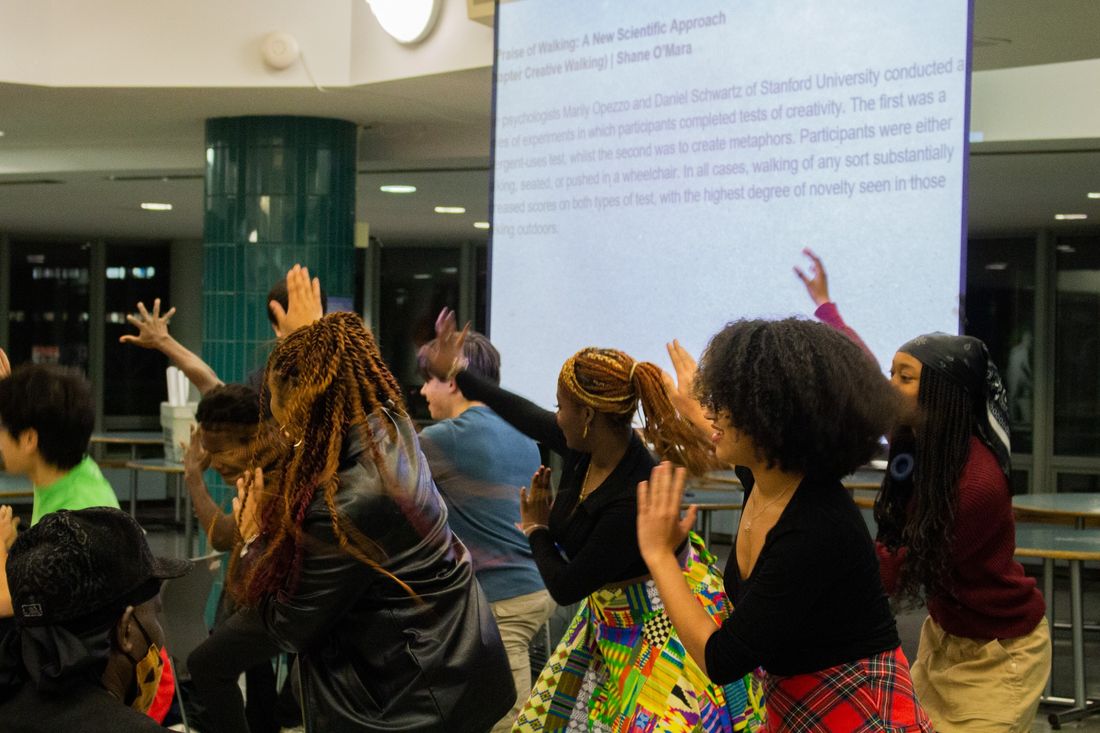Drumming into Black History Month with its Annual Dinner
Stuyvesant hosted the annual Black History Month dinner on February 9.
Reading Time: 3 minutes

Stuyvesant’s Black Students League (BSL) hosted the annual Black History Month dinner on February 9. This year, the dinner highlighted the theme of Black resilience both inside and outside of Stuyvesant. The dinner was filled with food, drinks, music, and dancing led by a guest drummer. It also featured guest speaker Kamau Ware, a long-time educator and the founder of Black Gotham Experience, who added to the conversation by stressing the need to address uncomfortable elements of Black history.
The event was made possible by the collaboration between BSL and the Stuyvesant administration. “[College counselor Jeaurel] Wilson, [school counselor Sandra] Brandon, [school counselor Undine] Guthrie, [school counselor Angel] Colon, [and Assistant Principal Casey] Pedrick [were a critical part of the event]. They handled catering, they bought decorations, [and] they invited the guest speaker to come,” junior and BSL Vice President Amanda Cisse said.
In particular, Stuyvesant’s Diversity Equity and Inclusion (DEI) committee was an instrumental part of planning the dinner in accordance with its goal of recognizing affinity groups at Stuyvesant. “[We are not just involved with BSL] and the Black History Month dinner. We actually had the Hispanic Heritage Month event, we’ve had the Spectrum event, we’ve helped with the Diwali event,” said Wilson, who co-founded the DEI committee. “Every other month it seems like we’re celebrating another affinity group, [and] it’s one of the many things we’re trying to do in Stuyvesant.”
One of the main takeaways that leaders of the BSL wanted attendees to leave with was a greater understanding of the Black community. “I hope people, especially non-Black people that came to the event, gained a sense of understanding for the students of color that are in this school [and] also Black people in general,” senior and BSL President Sukanya Ferguson said. “Since our theme was resilience, [the event] had to do with a lot of the adversity that Black people have faced, so I definitely wanted people to leave the event with an open mind.”
In accordance with this year’s theme, BSL leaders presented different facets of Black resilience such as Black fashion, Black people in power, Black Stuyvesant students, and Black Stuyvesant alumni in order to recognize Black accomplishments despite the continued struggles that many Black people face. “[There needs to be] just a little more understanding and appreciation for Black culture in the light of everything going on in our country with the banning of books and police brutality,” school counselor Audra Parris said.
For many attendees, a major highlight of the event was the dance activity, in which the guest drummer demonstrated a simple African four-step dance to student volunteers. Through this dance activity, attendees were able to experience a firsthand perspective of African heritage and better understand its influence on modern culture. “Many people don’t understand that they’re culturally influenced by Black culture and putting that [in] the spotlight means that Black people get the spotlight that they need,” sophomore Fabiha Khan said.
Additionally, the unified nature of the dance symbolized changes that the Black community hopes to see at Stuyvesant. “It was not just BSL and ASPIRA kids that were up there. I saw a White student, Asian students, and I think there were one or two South Asian students,” Colon said. “Even seeing a little bit of diversity in performing that dance [...] I think that was so beautiful. I would like to see more of that [in the future].”
Overall, many members of BSL were pleased with the number of non-Black attendees who chose to attend the dinner and participate in the dance. “Stage fright is real. And so it’s hard to go out there and perform in front of other people,” junior Jonathan Vasquez said. “The fact that everyone decided to learn a new dance, that was just nice seeing everyone trying to learn the culture with each other.”
Ferguson believes that Black History Month is a time to both commemorate Black history and discuss the future of the Black community, which emphasizes the need for this celebratory event. “Not only can Black History Month be a time to acknowledge what has happened in the past but [it can] also be able to set a foundation for the success and achievements of Black people in the future,” Ferguson said.
Ultimately, leaders of BSL felt that the engaging and interactive nature of the dinner allowed attendees to learn more about Black resilience throughout history. “After everyone saw the dancing, when everyone listened to the presentations, it all felt like people were hearing us out and listening to our voices, so hopefully that transcends beyond just my perspective and is exactly true,” Ferguson said.
